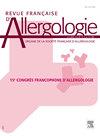0 - 6岁食物和非食物过敏儿童父母的健康生活方式
IF 0.3
4区 医学
引用次数: 0
摘要
食物过敏和非食物过敏儿童的父母的健康生活方式行为尚不清楚。目的探讨0 ~ 6岁食物过敏与非食物过敏患儿父母健康生活方式行为的差异。方法对2022年10月至2023年3月在艾丁妇产儿科医院收治的153例过敏儿童的家长进行分析性横断面研究。采用《个人信息表》和《健康促进生活方式资料II》收集资料,采用Mann-Whitney-U、卡方检验、Student-t检验进行分析。结果食物过敏儿童父母的健康促进生活方式ⅱ平均总分为135.4±19.5分,非食物过敏儿童父母的健康促进生活方式ⅱ平均总分为139.1±24.1分。过敏儿童父母在促进健康生活方式量表II总分上的差异无统计学意义(t = - 1.048, P >;0.05)。问卷其他各分量表间差异无统计学意义,但非食物过敏儿童家长的体力活动分量表平均得分高于食物过敏儿童家长(t = - 1.986, P = 0.049)。儿童年龄、父母受教育程度和家族史是食物过敏发生的重要因素(P <;0.05)。结论食物过敏儿童父母的健康生活方式行为与非食物过敏儿童父母的健康生活方式行为无显著差异,但非食物过敏儿童父母的健康生活方式仅在“身体活动”分量表上表现更好。建议保健专业人员重视这一问题,以改善弱势群体个人的健康生活方式。本文章由计算机程序翻译,如有差异,请以英文原文为准。
Healthy lifestyle in 0–6-year-old children's parents with food and non-food allergy
Background
Health lifestyle behaviors of parents with food and non-food allergic children are not well understood.
Objective
This study aimed to examine the difference between healthy lifestyle behaviors of parents of 0–6-year-old children with food allergies and non-food allergies.
Methods
This analytical cross-sectional study was conducted with the parents of 153 allergic children admitted to Aydin Obstetrics, Gynecology and Child Diseases Hospital between October 2022 and March 2023. “Personal Information Form” and “Health Promoting Lifestyle Profile II” were used to collect data and analyzed using Mann-Whitney-U, chi-square test, Student-t test.
Results
The mean total score of the Health-Promoting Lifestyle Profile II was 135.4 ± 19.5 for parents of food allergic children and 139.1 ± 24.1 for parents of non-food allergic children. There was no significant difference between the total scores of the Health-Promoting Lifestyle Profile II between the parents of allergic children (t = −1.048, P > 0.05). While there was no significant difference in terms of the other subscales of the questionnaire, the physical activity subscale mean score of parents of children with non-food allergies was higher than those with food allergies (t = −1.986, P = 0.049). Child's age, parental education level, and family history were found to be significant factors in the development of food allergies (P < 0.05).
Conclusion
While there was no difference in the healthy lifestyle behaviors of parents with food allergic and non-food allergic children, it was concluded that parents with non-food allergic children had better lifestyles only for the “Physical Activity” subscale. It may be recommended that healthcare professionals should give importance to this issue to improve the healthy lifestyle of individuals in vulnerable groups.
求助全文
通过发布文献求助,成功后即可免费获取论文全文。
去求助
来源期刊

Revue Francaise d Allergologie
Medicine-Immunology and Allergy
自引率
33.30%
发文量
349
期刊介绍:
La Revue Française d''Allergologie : un véritable forum pour faire connaître des travaux originaux et permettre la diffusion de l''information auprès de toutes les spécialités concernées par les pathologies allergiques. La Revue Française d''Allergologie (8 numéros par an) est au carrefour de nombreuses spécialités - dermatologie, pédiatrie, ORL, pneumologie, ophtalmologie, médecine interne - qui, toutes, ont à traiter des maladies allergiques. Les symptômes des allergies fondés sur des mécanismes communs sont le plus souvent associés et se succèdent chez un même patient. En forte progression depuis 20 ans, les maladies allergiques sont dans l''attente de perfectionnements et d''avancées thérapeutiques qui permettront aux nombreux patients qui en sont atteints de mieux vivre avec leurs allergies. La Revue Française d''Allergologie se veut donc un véritable forum de discussions et d''échanges entre tous les spécialistes confrontés aux pathologies
 求助内容:
求助内容: 应助结果提醒方式:
应助结果提醒方式:


